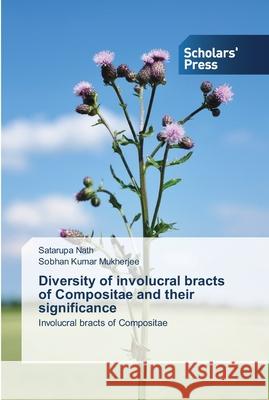Diversity of involucral bracts of Compositae and their significance » książka
Diversity of involucral bracts of Compositae and their significance
ISBN-13: 9783639766424 / Angielski / Miękka / 2015 / 144 str.
In Asteraceae, a set of bracts are found as a whorl surround the base of the inflorescence, known as involucres. These bracts are also known as involucral bracts. In the present work bracts of 20 tribes of the family Asteraceae have been presented. On the basis of present 1445 studied genera, The classification of Compositae can be updated on the basis of taxonomic studies of variation of bracts.This type of systematic study is a valuable tool for plant taxonomists. This book is neither a conventional text book nor for only examination purposes. It is a little effort to develop interest to the students of Botany and plant lovers, interested about the diversities of bract structure in plants especially for the family Compositae. This book will definitely serve as an excellent reference material and practical guide for scientist, teachers, students, and interested in Botany, Forestry, Agriculture science and other related fields of Botany, who are working with the family Compositae. We appreciate the all-round cooperation and support of Helga Dabrovski, Acquisition Editor of Scholars' Press, Germany for printing and publishing this book with patience, care and interest.
In Asteraceae, a set of bracts are found as a whorl surround the base of the inflorescence, known as involucres. These bracts are also known as involucral bracts. In the present work bracts of 20 tribes of the family Asteraceae have been presented. On the basis of present 1445 studied genera, The classification of Compositae can be updated on the basis of taxonomic studies of variation of bracts.This type of systematic study is a valuable tool for plant taxonomists. This book is neither a conventional text book nor for only examination purposes. It is a little effort to develop interest to the students of Botany and plant lovers, interested about the diversities of bract structure in plants especially for the family Compositae. This book will definitely serve as an excellent reference material and practical guide for scientist, teachers, students, and interested in Botany, Forestry, Agriculture science and other related fields of Botany, who are working with the family Compositae. We appreciate the all-round cooperation and support of Helga Dabrovski, Acquisition Editor of Scholars Press, Germany for printing and publishing this book with patience, care and interest.











